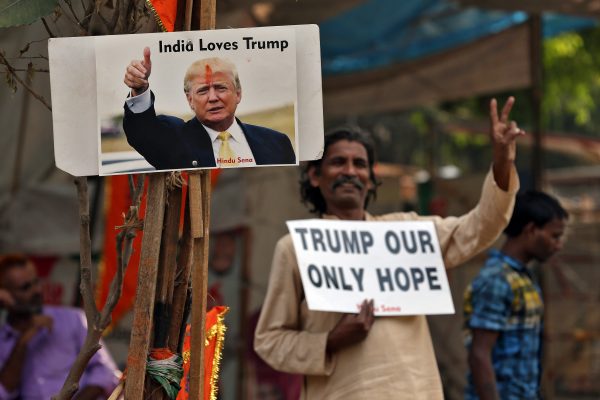This comes just after Washington snubbed Russia’s invitation to join its Afghan peace talks and used the ‘mother of all bombs’ against the so called ‘Islamic State’ in eastern Afghanistan.
In Washington, Trump’s pre-election rhetoric is subsiding and the administration is adopting a more assertive and muscular regional policy to fill the diplomatic void created in South Asia during the US presidential election campaign. From the perspective of major power politics, it is obvious that the United States will not cede any space to China or Russia in the region. The United States will seek to preserve its preponderant position in South Asia as the major security guarantor, conflict stabiliser and arbiter.
China’s growing economic footprint in the region through its Belt and Road Initiative, the movement of Chinese submarines in the Indian Ocean through Pakistan’s Gwadar port and Russia’s strengthening position in Afghanistan all potentially undermine US geopolitical interests in the region. And Russia’s return to Afghanistan has divided the region into two competing diplomatic blocs: Russia, China, Pakistan and Central Asia against the United States, India, Afghanistan and NATO.
India is a natural partner of the United States in South Asia. Long-term India–US interests in the region are aligned: containing China, fighting growing Islamic radicalism and militancy, curtailing nuclear proliferation and black-marketing as well as supporting democracy in Afghanistan by keeping the Taliban out of the power structure. Going forwards, New Delhi wants a US policy that addresses its concerns about Pakistan and that gives India more room as a regional hegemon in South Asia, under the US umbrella.
Since 9/11, despite maintaining close diplomatic ties with India, successive US administrations have kept India’s role in Afghanistan confined to economic development and nation-building. Washington has been sensitive to Pakistani security concerns around India’s involvement in Afghanistan. This has frustrated India. But it is likely to change under the Trump administration, which may allow India to play a more assertive role in the security domain in Afghanistan.
Pakistan–US ties look set to remain transactional, short-term and trouble-prone. The Trump administration will continue to view Pakistan through the narrow security lens of counter-terrorism and the conflict in Afghanistan.
Going by McMaster’s statements in Islamabad, the United States will pressure Pakistan to take demonstrable action against all kinds of militant movements, including Pakistan based anti-India and anti-Afghanistan groups. Washington will also turn up the heat on Pakistan to expedite the slow-moving trial of the man accused of the 2008 Mumbai attacks. ‘Do more’ will become the phrase the United States uses most towards Pakistan. And US military and economic assistance to Pakistan will likely be slashed along with making it conditional and criteria-based.
Significantly, the United States will keep its dealings with Pakistan and India separate despite the intricately intertwined nature of their bilateral disputes. The US Ambassador to the UN Nikki Haley had earlier offered to mediate between India and Pakistan over Kashmir. But the White House retracted these comments, encouraging the two South Asian nuclear rivals to resolve the dispute through direct dialogue.
Washington does not view India through a narrow South Asian prism but as its partner in the Asia Pacific to contain China not just in the Indian Ocean but in the Indo-Pacific as well. In contrast, Pakistan is seen as an unreliable partner due to its growing ties with China and Russia. And it appears the United States may further strengthen its drone warfare program in the Afghanistan–Pakistan border region.
US South Asia policy will largely be a continuation of the status quo but with more aggressive military and diplomatic posturing. This adjustment is unlikely to change the complex realities on the ground.
The deadlock of the Afghan conflict, mounting tensions in India–Pakistan ties and the estrangement of the United States and Pakistan will all continue. Irrespective of their economic, diplomatic and military prowess, neither China nor Russia is in a position to meaningfully challenge the United States’ preponderant position in South Asia. At the same time, Pakistan (at its own peril) is unlikely to change its Afghanistan policy or alter its ways of dealing with various militant groups.
Abdul Basit is an Associate Research Fellow at the S. Rajaratnam School of International Studies, Nanyang Technological University, Singapore. He tweets at @basitresearcher.


Abdul Basit your love of your land, Pakistan, is ‘clearly visible’ in your article. You are making great image of Pakistan. We, including your parents here in Pakistan are proud of you. Good job done
While it may sound emotional, it is highly likely that Trump will not make either the America or any other countries great! As for America, it is because he is working against the comparative advantages of the USA, period. As a result, he will damage the long-term interests of the USA.
As for others, he does not have any desire or intention to do so. Any benefits which any other countries may actually get as a result will be accidental. Alternatively, his attempts to make America great again by working against its comparative advantages may unintentionally benefit its competitors. And many may be considered as such competitors.